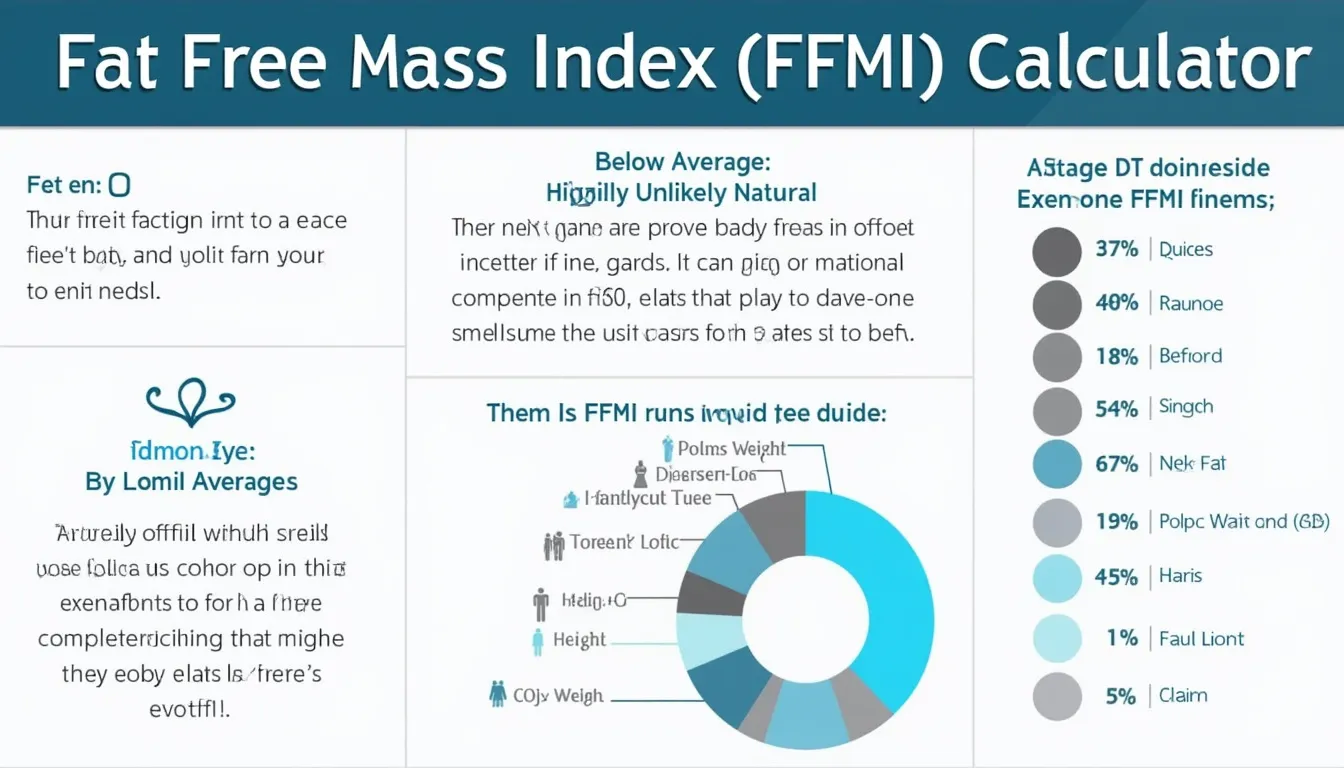Fat Free Mass Index Calculator
Is this tool helpful?
How to Use the FFMI Calculator Effectively
Our Fat Free Mass Index (FFMI) Calculator is designed to help you assess your lean body mass and muscular development. To use the calculator effectively, follow these simple steps:
- Enter your height in meters (e.g., 1.75 for 175 cm)
- Input your weight in kilograms (e.g., 70 for 70 kg)
- Provide your body fat percentage (e.g., 15 for 15%)
- Click the “Calculate FFMI” button
- View your FFMI result and corresponding category
The calculator will instantly provide you with your Fat Free Mass Index and categorize your result, giving you valuable insights into your body composition and muscular development potential.
Understanding the Fat Free Mass Index: Definition, Purpose, and Benefits
The Fat Free Mass Index (FFMI) is a metric used to estimate an individual’s lean body mass in relation to their height. It was developed as an improvement upon the Body Mass Index (BMI) to better account for muscular individuals who may be incorrectly classified as overweight or obese by BMI standards alone.
The primary purpose of the FFMI is to:
- Assess lean body mass and muscular development
- Provide a more accurate representation of body composition than BMI
- Help identify potential use of performance-enhancing substances
- Set realistic goals for natural muscle gain
By using the FFMI calculator, you can gain valuable insights into your body composition, track your progress in muscle-building efforts, and set realistic goals for your fitness journey.
Benefits of Using the FFMI Calculator
Incorporating the FFMI Calculator into your fitness routine offers numerous benefits:
- Accurate Body Composition Assessment: Unlike BMI, which doesn’t differentiate between muscle and fat, FFMI provides a more precise picture of your lean body mass.
- Goal Setting: Understanding your FFMI helps you set realistic muscle-building goals based on your natural potential.
- Progress Tracking: Regularly calculating your FFMI allows you to monitor changes in lean body mass over time.
- Motivation: Seeing improvements in your FFMI can be a powerful motivator to continue your fitness journey.
- Identifying Natural Limits: FFMI can help you understand the upper limits of natural muscle gain, potentially preventing unrealistic expectations.
- Customized Training and Nutrition: Your FFMI can guide you in tailoring your workout and diet plans to optimize muscle growth and fat loss.
How the FFMI Calculator Addresses User Needs and Solves Specific Problems
The FFMI Calculator addresses several key user needs and solves specific problems related to body composition assessment and muscle-building goals:
1. Overcoming BMI Limitations
While BMI is widely used, it fails to account for muscle mass, often misclassifying muscular individuals as overweight or obese. The FFMI Calculator solves this problem by focusing specifically on lean body mass, providing a more accurate assessment for athletes and bodybuilders.
2. Setting Realistic Muscle-Building Goals
Many individuals struggle with setting achievable muscle-building goals, often influenced by unrealistic media portrayals or enhanced athletes. The FFMI Calculator helps users understand their natural muscle-building potential, allowing them to set realistic and attainable goals.
3. Tracking Progress Accurately
Traditional methods like weight or BMI tracking can be misleading when building muscle and losing fat simultaneously. The FFMI Calculator provides a more reliable metric for tracking lean mass gains over time, helping users stay motivated and focused on their fitness journey.
4. Identifying Potential Steroid Use
For natural athletes and bodybuilders, it’s crucial to understand the upper limits of muscle gain without performance-enhancing substances. The FFMI Calculator helps identify FFMI values that are highly unlikely to be achieved naturally, providing valuable context for competitive athletes and fitness enthusiasts.
5. Customizing Fitness and Nutrition Plans
By providing a clear picture of an individual’s lean body mass, the FFMI Calculator enables users to tailor their workout routines and nutrition plans more effectively. This personalized approach can lead to better results and more efficient progress towards fitness goals.
The Mathematics Behind the FFMI Calculator
The Fat Free Mass Index is calculated using a series of steps that take into account your height, weight, and body fat percentage. Here’s the mathematical formula used in our FFMI Calculator:
$$ \text{FFMI} = \frac{\text{Lean Body Mass (kg)}}{\text{Height (m)}^2} + 6.1 \times (1.8 – \text{Height (m)}) $$Where:
$$ \text{Lean Body Mass (kg)} = \text{Total Weight (kg)} – (\text{Body Fat Percentage} \times \text{Total Weight (kg)}) $$The final term (6.1 × (1.8 – Height)) is a normalization factor that adjusts the FFMI for height, allowing for fair comparisons between individuals of different heights.
Example Calculation
Let’s walk through an example calculation to illustrate how the FFMI Calculator works:
Consider an individual with the following measurements:
- Height: 1.80 m
- Weight: 85 kg
- Body Fat Percentage: 12%
Step 1: Calculate Lean Body Mass
$$ \text{Lean Body Mass} = 85 – (0.12 \times 85) = 74.8 \text{ kg} $$Step 2: Calculate basic FFMI
$$ \text{Basic FFMI} = \frac{74.8}{1.80^2} = 23.09 $$Step 3: Apply height normalization
$$ \text{Normalized FFMI} = 23.09 + 6.1 \times (1.8 – 1.80) = 23.09 $$In this case, the individual’s FFMI is 23.09, which falls into the “Excellent” category.
Practical Applications of the FFMI Calculator
The FFMI Calculator has numerous practical applications across various fitness and health-related fields:
1. Bodybuilding and Strength Training
Bodybuilders and strength athletes can use the FFMI Calculator to:
- Set realistic muscle-building goals based on their natural potential
- Track progress in lean mass gains over time
- Compare their development to established norms in the sport
2. Sports Performance
Athletes in various sports can benefit from the FFMI Calculator by:
- Optimizing their body composition for their specific sport
- Monitoring changes in lean mass during different training phases
- Ensuring they maintain a healthy body composition while meeting performance demands
3. Personal Training and Fitness Coaching
Personal trainers and fitness coaches can utilize the FFMI Calculator to:
- Assess clients’ current body composition accurately
- Design personalized training and nutrition plans based on FFMI results
- Provide realistic expectations and goals for clients
- Track and demonstrate progress to clients over time
4. Health and Wellness
In the broader health and wellness field, the FFMI Calculator can be used to:
- Complement other health metrics for a more comprehensive assessment of body composition
- Guide nutritional interventions for individuals looking to improve their lean mass to fat ratio
- Monitor changes in body composition during weight loss or muscle-building programs
5. Research and Studies
Researchers in fields related to exercise science, nutrition, and body composition can use the FFMI Calculator to:
- Standardize measurements of lean body mass across study participants
- Investigate the effects of various interventions on lean mass development
- Explore the upper limits of natural muscle growth in different populations
Frequently Asked Questions (FAQ)
1. What is a good FFMI score?
FFMI scores are typically categorized as follows:
- 16 – 17: Below average
- 18 – 19: Average
- 20 – 21: Above average
- 22: Excellent
- 23 – 25: Superior
- 26 – 27: Suspicious but still attainable naturally
- 28 – 30: Highly unlikely to be obtained naturally without steroid usage
2. How often should I calculate my FFMI?
For most individuals, calculating FFMI every 4-6 weeks is sufficient to track progress. More frequent calculations may not show significant changes and could lead to unnecessary stress or obsession with numbers.
3. Can women use the FFMI Calculator?
Yes, women can use the FFMI Calculator. However, it’s important to note that women naturally have higher body fat percentages and lower muscle mass than men, so their FFMI scores will typically be lower. The interpretation of results should take this into account.
4. How accurate is the FFMI Calculator?
The FFMI Calculator is generally considered more accurate than BMI for assessing lean body mass. However, its accuracy depends on the accuracy of the input data, particularly the body fat percentage. For the most precise results, use accurate methods to measure body fat, such as DEXA scans or hydrostatic weighing.
5. Can FFMI be used to detect steroid use?
While FFMI can provide some indication of potential steroid use, it should not be used as a definitive test. FFMI scores above 25 are considered suspicious, and scores above 28 are highly unlikely to be achieved naturally. However, individual genetics, training history, and other factors can influence FFMI, so it should be used as one of many tools in assessing potential steroid use.
6. How does FFMI compare to other body composition metrics?
FFMI is generally considered more accurate than BMI for assessing lean mass, especially in athletic populations. However, it’s not as comprehensive as methods like DEXA scans or hydrostatic weighing. FFMI is a useful tool when used in conjunction with other metrics and assessments.
7. Can I use FFMI to set weight loss goals?
While FFMI is primarily used for assessing lean mass, it can be helpful in setting weight loss goals by providing a target for maintaining or increasing lean mass while losing fat. This can help ensure that weight loss comes primarily from fat rather than muscle tissue.
Please note that while we strive for accuracy and reliability, we cannot guarantee that the webtool or results from our webtool are always correct, complete, or reliable. Our content and tools might have mistakes, biases, or inconsistencies.
Conclusion: Harnessing the Power of the FFMI Calculator
The Fat Free Mass Index (FFMI) Calculator is a powerful tool for anyone serious about fitness, bodybuilding, or overall health. By providing a more accurate assessment of lean body mass than traditional metrics like BMI, the FFMI Calculator enables users to:
- Set realistic muscle-building goals
- Track progress in lean mass development over time
- Optimize training and nutrition plans
- Understand their natural muscle-building potential
- Make informed decisions about their fitness journey
Whether you’re a seasoned athlete, a fitness enthusiast, or someone just starting their health journey, the FFMI Calculator offers valuable insights that can help guide your efforts and keep you motivated.
Take the first step towards a more informed and effective fitness journey today. Use our FFMI Calculator to assess your current status, set achievable goals, and start working towards your ideal physique. Remember, knowledge is power, and understanding your body composition is key to achieving lasting fitness success.
Start using the FFMI Calculator now and unlock your true fitness potential!
Important Disclaimer
The calculations, results, and content provided by our tools are not guaranteed to be accurate, complete, or reliable. Users are responsible for verifying and interpreting the results. Our content and tools may contain errors, biases, or inconsistencies. We reserve the right to save inputs and outputs from our tools for the purposes of error debugging, bias identification, and performance improvement. External companies providing AI models used in our tools may also save and process data in accordance with their own policies. By using our tools, you consent to this data collection and processing. We reserve the right to limit the usage of our tools based on current usability factors. By using our tools, you acknowledge that you have read, understood, and agreed to this disclaimer. You accept the inherent risks and limitations associated with the use of our tools and services.







